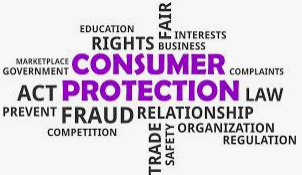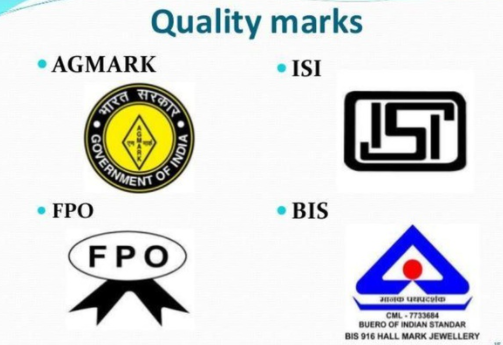
Consumer Awareness and Protection. Summary with questions and answers. Here you will find The Consumer Awareness and Protection with a small gist/explanation of the chapter and related questions and answers.
Consumer Awareness and Protection: Introduction
You might have listened to or might have experienced yourself problems in purchases, use and consumption of goods and services. Appropriate legal protection is needed for consumers to protect them from various forms of exploitation from the seller. The area of consumer protection has emerged as a very important area of study having significance for both the consumers and businesses alike.

Consumer: Meaning
A consumer is said to be a king in a free market economy. The growing competition may tempt the businesses to engage in exploitative and unfair trade practices like defective and unsafe products, adulteration, false and misleading advertising, hoarding, black marketing etc.
Therefore the consumer might be exposed to risks due to unsafe products. This can affect them in various ways.
There is a need for providing adequate protection to consumers against such practices of the sellers.
Consumer Awareness: Importance of consumer protection

Consumer Protection educates consumers about their rights and responsibilities. It also helps to get their grievances redressed. It includes various machinery such as judicial machinery for protecting the interests of consumers. Consumer protection also helps them to get together and form themselves into consumer associations for the protection and promotion of their interests.
Consumer protection has a special significance for businesses too.
Consumers’ point of view
(i) Consumer Ignorance: Most consumers do not even know that they have rights and reliefs available. Therefore we should educate them to achieve consumer awareness.
(ii) Unorganised Consumers: Consumers need to be organised in the form of consumer organisations. These consumer organisations would take care of their interests.
(iii) Widespread Exploitation of Consumers: Consumers need protection against the malpractices of the sellers. These malpractices will harm consumers if not educated.
The point of view of Business
(i) Long-term Interest of Business: Business firms should aim at long-term profit maximisation through customer satisfaction. Because satisfied customers repeat sales and provide good feedback which help in increasing the customer-base of business.
(ii) Business uses Society’s Resources: Business organisations use resources which belong to the society. They, thus, have a responsibility to supply such products and render such services which are in the public interest.
(iii) Social Responsibility: A business has social responsibilities towards various interest groups.
(iv) Moral Justification: It is the moral duty of any business to take care of the consumer’s interest. They should avoid any form of exploitation.
(v) Government Intervention: A business engaging in any form of exploitative trade practices would invite government intervention or action. This can impair and tarnish the image of the company. This will lead to less sales and ultimately shutting down of the company.
Consumer Awareness: Legal protection to consumers
- The Consumer Protection Act, 1986: It seeks to protect and promote the interests of consumers. The Act provides safeguards to consumers against unfair practices of businesses. It also provides for the formation of consumer protection councils in every District and State, and at the apex level.
- The Indian Contract Act, 1872: The Act lays down the conditions in which the promises made by parties to a contract will be binding on each other. The Act also specifies the remedies available to parties in case of breach of contract.
- The Sale of Goods Act, 1930: Buyers of the goods can get some safeguards and reliefs in case the goods purchased by them are faulty.
- The Essential Commodities Act, 1955: The Act aims at controlling production, supply and distribution of essential commodities, checking inflationary trend in their prices and ensuring equal distribution of essential commodities. The Act also provides for action against anti-social activities of profiteers, hoarders and black marketers.
- The Agricultural Produce (Grading and Marking) Act, 1937: The Act prescribes grade standards for agricultural commodities and livestock products. The quality mark provided under the Act is known as AGMARK, an acronym for Agricultural Marketing.
- The Prevention of Food Adulteration Act, 1954: The Act aims to check adulteration of food articles and ensure their purity to maintain public health.
- The Standards of Weights and Measures Act, 1976: The provisions of this Act are applicable in case of those goods which are sold or distributed by weight, measure or number.

More acts to protect consumers

- The Trade Marks Act, 1999: This Act has repealed and replaced the Trade and Merchandise Marks Act, 1958. The Act prevents the use of fraudulent marks on products and thus, protects the consumers against such products.
- The Competition Act, 2002: This Act has repealed and replaced the Monopolies and Restrictive Trade Practices Act, 1969. The Act protects the consumers in case of practices adopted by business firms which hamper competition in the market.
- The Bureau of Indian Standards Act, 1986: The Bureau of Indian Standards has been set up under the Act. The Bureau has two major activities such as:
- Formulation of quality standards for goods.
- Their certification through the BIS certification scheme. Manufacturers are permitted to use the ISI mark on their products only after ensuring that the goods conform to the prescribed quality standards.
The most important of these regulations is the Consumer Protection Act. Because:
- It provides six important consumer rights
- Helps the consumers in getting their grievances redressed for any shortcoming in the goods purchased or services availed.
The consumer protection act, 1986
The Consumer Protection Act (CPA) seeks to protect and promote the consumers’ interest through speedy and inexpensive redressal of their grievances. It is applicable to all types of undertakings. The Act confers certain rights to consumers with a view to empowering them and to protect their interests.
Right to Safety: The consumer has a right to be protected against goods and services which are hazardous to life and health.
The Right to be Informed: The consumer has a right to have complete information about the product he intends to buy.
Right to Choose: The consumer has the freedom to choose from a variety of products at competitive prices.
The Right to be Heard: The consumer has a right to file a complaint and to be heard in case of dissatisfaction with a good or a service
The Right to seek Redressal: The consumer has a right to get relief in case the product or service falls short of his expectations.
Right to Consumer Education: The consumer has a right to acquire knowledge and to be a well-informed consumer throughout life.
The CPA works hard but it is also the responsibility of the consumer to use it fairly.
Also Read : 10 Best international scholarships for Indian students
Consumer should:
(i) Be aware of various goods and services available in the market so that an intelligent and a wise choice can be made.
(ii) Likewise, buy only standardised goods as they provide quality assurance.
(iii) Learn about the risks associated with products and services, follow the manufacturer’s instructions and use the products safely.
(iv) Moreover, read labels carefully to have information.
(v) Assert yourself to ensure that you get a fair deal.
(vi) Be honest in your dealings. Choose only from legal goods and services and discourage unscrupulous practices like black-marketing, hoarding etc.
(vii) Ask for a cash memo on the purchase of goods or services.
(viii) File a complaint in an appropriate consumer forum in case of a shortcoming in the quality of goods purchased or services availed. Do not fail to take any action even when the amount involved is small.
(ix) Form consumer societies which would play an active part in educating consumers and safeguarding their interests.
(x) Respect the environment. Avoid waste, littering and contributing to pollution.
Ways and means of consumer protection
1. Self Regulation by Business: Enlightened business firms realise that it is in their long-term interest to serve the customers well.They should follow ethical standards and practices in dealing with their customers.
2. Business Associations: The associations of trade, commerce and business-like Federation of Indian Chambers of Commerce of India (FICCI) and Confederation of Indian Industries (CII) have laid down their code of conduct which lay down for their members the guidelines in their dealings with the customers.
3. Consumer Awareness: A consumer, who is well informed about his rights and the reliefs available to him, would be in a position to raise his voice against any unfair trade practices or unscrupulous exploitation.
4. Consumer Organisations: Consumer organisations play an important role in educating consumers about their rights and providing protection to them. These organisations can force business firms to avoid malpractices and exploitation of consumers.
5. Government: Meanwhile, the government can protect the interests of the consumers by enacting various legislations. One of these legislations is the Consumer Protection Act, 1986.
Redressal agencies
Let us now see how the consumer grievances are redressed by the three-step machinery under the Consumer Protection Act.
District Forum:
- The District Forum consists of a President and two other members, one of whom should be a woman. The concerned State Government appoints all of them.
- The goods or services in question, along with the compensation claimed should not exceed Rs. 20 lakhs here.
- Firstly, On receiving the complaint, the District Forum shall refer the complaint to the party against whom the complaint is filed. If required, the goods or a sample thereof shall be sent for testing in a laboratory.
- Meanwhile, after considering the test report from the laboratory and hearing party the District forum shall pass an order. The aggrieved party can take the matter to the State Commission if still not satisfied with the result within 30 days of the passing of the order.
State Commission:
- Each State Commission consists of a President and not less than two other members, one of whom should be a woman. The concerned State Government appoints them.
- The goods or services in question, along with the compensation claimed should exceed Rs. 20 lakhs but should not exceed Rs. 1 crore here.
- Appeals filed before the State Commission can also be against the orders of a District Forums.
- Firstly, on receiving the complaint, the State Commission shall refer the complaint to the party against whom the complaint is filed.
- Secondly, if required, the goods or a sample thereof shall be sent for testing in a laboratory.
- Meanwhile, after considering the test report from the laboratory and hearing party the State Commission shall pass an order.
- The aggrieved party can take the matter to the National Commission if still not satisfied with the result within 30 days of the passing of the order.
National Commission:
- The National Commission consists of a President and at least four other members, one of whom should be a woman. The Central Government appoints them.
- The goods or services in question, along with the compensation claimed can exceed Rs. 1 crore here.
- Appeals filed before the National Commission can also be against the orders of a State Commission.
- Firstly, on receiving the complaint, the National Commission shall refer the complaint to the party against whom the complaint is filed.
- Secondly, if required, the goods or a sample thereof shall be sent for testing in a laboratory.
- Meanwhile, after considering the test report from the laboratory and hearing party the National Commission shall pass an order.
- An order passed by the National Commission in a matter of its original jurisdiction is appealable before the Supreme Court. This means that only those appeals where the value of goods and services in question, along with the compensation claimed, exceeded Rs. 1 crore. The aggrieved party can take the matter to the Supreme Court of India if still not satisfied with the result.
Consumer Awareness: Reliefs
Genuineness of the complaint can make relief is available or the court may appoint any one of these to the party:
- To remove the defect in goods or deficiency in service.
- Replace the defective product with a new one.
- To refund the price paid for the product, or the charges paid for the service.
- Pay a reasonable amount of compensation for any loss or injury suffered by the consumer due to the negligence of the opposite party.
- To pay punitive damages in appropriate circumstances.
- To discontinue the unfair/ restrictive trade practice and not to repeat it in the future.
- Not to offer hazardous goods for sale.
- To withdraw the hazardous goods from sale.
- Cease the manufacture of hazardous goods and to desist from offering hazardous services.
- To pay any amount (not less than 5% of the value of the defective goods or deficient services provided).
- Issue a corrective advertisement to neutralise the effect of a misleading advertisement.
- To pay adequate costs to the appropriate party.
Role of NGOs
Let us see how the NGOs have helped people:
(i) Educating the general public about consumer rights by organising training programmes, seminars and workshops
(ii) Publishing periodicals and other publications to impart knowledge about consumer problems. Such as. legal reporting, reliefs available and other matters of interest.
(iii) Carrying out comparative testing of consumer products in accredited laboratories to test relative qualities of competing brands. They should be publishing the test results for the benefit of consumers.
(iv) Encouraging consumers to strongly protest and take an action against unscrupulous, exploitative and unfair trade practices of sellers.
(v) Providing legal assistance to consumers by way of providing aid, legal advice etc. in seeking a legal remedy.
(vi) Filing complaints inappropriate consumer courts on behalf of the consumers.
(vii) Taking an initiative in filing cases in consumer courts in the interest of the general public, not for any individual.
Conclusion
Consumer protection is important because consumers are ignorant, not organised and exploited by sellers. Consumer Protection is also important for a business because it helps in the long-term interest of business and it avoids government intervention in the functioning of the business which might provide the business with a bad reputation. It is the need of the hour. We, as consumers should also be alert of the malpractices and help others.